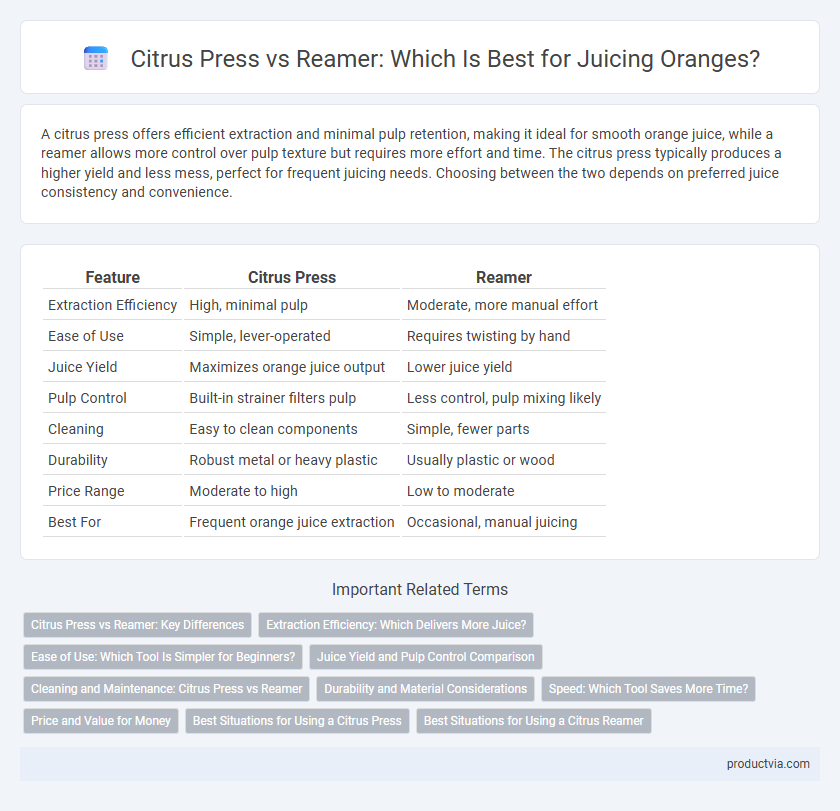A citrus press offers efficient extraction and minimal pulp retention, making it ideal for smooth orange juice, while a reamer allows more control over pulp texture but requires more effort and time. The citrus press typically produces a higher yield and less mess, perfect for frequent juicing needs. Choosing between the two depends on preferred juice consistency and convenience.
Table of Comparison
| Feature | Citrus Press | Reamer |
|---|---|---|
| Extraction Efficiency | High, minimal pulp | Moderate, more manual effort |
| Ease of Use | Simple, lever-operated | Requires twisting by hand |
| Juice Yield | Maximizes orange juice output | Lower juice yield |
| Pulp Control | Built-in strainer filters pulp | Less control, pulp mixing likely |
| Cleaning | Easy to clean components | Simple, fewer parts |
| Durability | Robust metal or heavy plastic | Usually plastic or wood |
| Price Range | Moderate to high | Low to moderate |
| Best For | Frequent orange juice extraction | Occasional, manual juicing |
Citrus Press vs Reamer: Key Differences
A citrus press provides efficient juice extraction with minimal pulp by pressing the halved orange directly, ensuring maximum yield and consistent flavor. In contrast, a reamer requires manual twisting and often produces more pulp and seeds, which may affect the texture of the orange juice. The citrus press excels in ease of use and speed, while the reamer offers more control over pulp and juice separation.
Extraction Efficiency: Which Delivers More Juice?
Citrus presses generally deliver higher extraction efficiency than reamers due to their mechanical leverage, which extracts more juice by pressing the fruit firmly. Reamers rely on manual twisting and pressure, often leaving more juice in the pulp and membranes. Studies indicate that citrus presses can yield up to 20-30% more juice from oranges compared to reamers, making them ideal for maximizing juice output.
Ease of Use: Which Tool Is Simpler for Beginners?
The citrus press offers greater ease of use for beginners due to its ergonomic handle and straightforward pressing mechanism, minimizing effort and mess during orange juice extraction. In contrast, the reamer requires more manual twisting and control, which can be challenging for those unfamiliar with juicing techniques. Beginners often find the citrus press more intuitive and less physically demanding, making it a preferred choice for quick and simple orange juice preparation.
Juice Yield and Pulp Control Comparison
Citrus presses typically extract higher juice yield from oranges by applying consistent pressure, maximizing liquid extraction while minimizing pulp inclusion. Reamers, being manual and more variable in pressure, often produce lower juice yield but allow greater control over pulp content by adjusting extraction speed and rotation. Choosing between the two depends on prioritizing either efficient juice extraction or customizable pulp texture in orange juice preparation.
Cleaning and Maintenance: Citrus Press vs Reamer
Citrus presses typically feature removable parts that are dishwasher-safe, making cleaning straightforward and time-efficient compared to reamers, which often require manual scrubbing of grooves to remove pulp and seeds. The solid construction of citrus presses minimizes residue buildup, reducing maintenance frequency and prolonging durability. Reamers, due to their simpler, one-piece design, may be easier to rinse quickly but can harbor pulp in hard-to-clean areas if not thoroughly washed immediately after use.
Durability and Material Considerations
Citrus presses typically feature durable materials such as stainless steel and heavy-duty aluminum, ensuring long-lasting performance and resistance to corrosion, while reamers are often made from plastic or wood, which may wear down more quickly with frequent use. The solid construction of a citrus press provides greater durability, making it ideal for regular juicing of tough citrus fruits like oranges. Material quality directly impacts maintenance needs and lifespan, with metal presses offering enhanced sturdiness and ease of cleaning compared to reamers.
Speed: Which Tool Saves More Time?
A citrus press typically extracts orange juice faster than a reamer because its lever mechanism efficiently squeezes juice with minimal effort. Reamers require manual twisting, which can be time-consuming especially for larger quantities. Therefore, for quick juice extraction, a citrus press saves more time compared to a reamer.
Price and Value for Money
Citrus presses typically offer better value for money due to their manual leverage, which extracts more juice with less effort, often priced between $20 and $50. Reamers, usually under $15, are more affordable but less efficient, requiring greater physical effort and producing less juice per fruit. Investing in a mid-range citrus press can save time and maximize juice yield, making it a more cost-effective choice for regular orange juice consumption.
Best Situations for Using a Citrus Press
A citrus press excels in efficiently extracting juice from larger quantities of oranges, making it ideal for preparing fresh orange juice in bulk. Its sturdy lever mechanism applies consistent pressure, which minimizes effort and maximizes juice yield compared to manual reaming. Best suited for households or small cafes, a citrus press ensures quick, effortless juicing with less pulp and easy cleanup.
Best Situations for Using a Citrus Reamer
A citrus reamer excels in extracting juice from oranges when precision and control are needed, particularly for small batches or single servings. Its pointed, ridged design efficiently breaks down the orange's membranes, maximizing juice yield without incorporating excessive pulp or bitterness. Ideal for recipes requiring fresh, bright orange juice with minimal effort, it outperforms other manual tools in simplicity and ease of cleaning.
Citrus press vs reamer for orange juice Infographic

 productvia.com
productvia.com